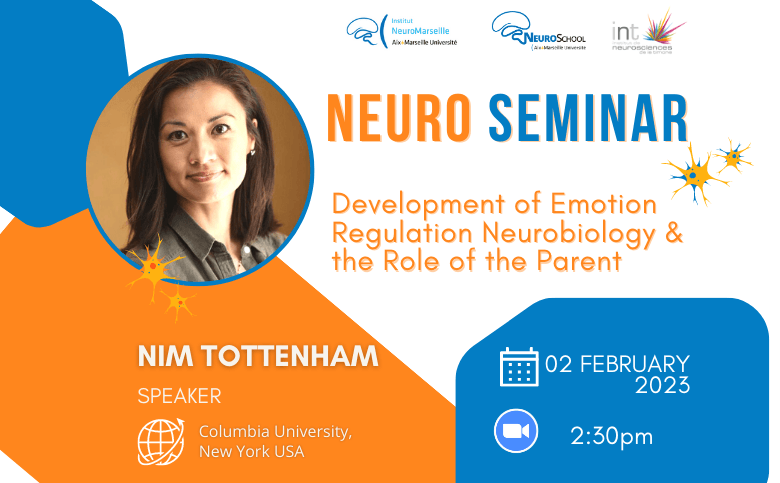
NeuroSchool seminar: Prof. Nim Tottenham
Development of Emotion Regulation Neurobiology & the Role of the Parent
Thursday, February 2nd, 2023, the NeuroSchool PhD Program will invite Prof. Nim Tottenham (Columbia University, New York, USA) for a seminar entitled “Development of Emotion Regulation Neurobiology & the Role of the Parent“.
Abstract
Humans have the most complex emotional repertoire in the animal kingdom, but it takes a very long time to reach full adult functioning. The nature of emotional brain development maximizes its chances of being influenced by social environments. Variations in early species-typical experiences, such as parental caregiving, reveal the profound effects of such influences on the development of neurocircuitry involved in affective learning and regulation (e.g., amygdala, hippocampus, medial prefrontal cortex). This talk will focus on both typical development as well as development following caregiving-related stress showing that early life environments may influence development through learning and modification of developmental trajectories. These age-related changes will be discussed in terms of potential developmental sensitive periods for environmental influence.
Thursday, February 2, 2023, Online
Currently, the schedule is as follows:
- 1:30 pm – Discussion among students to discuss the papers – For Ph.D students only – online
- 2:30 pm – Seminar – Open to all – online
- 3:30 pm – Special discussion time with the speaker – online
📢 Ph.D. Students, register on AMETICE for your hours to be counted. Attendants get 3 hours, chairpersons 4 hours.
Register to Prof. Nim Tottenham's seminar and receive the zoom link
Our speaker
Nim Tottenham, PhD is a Professor of Psychology at Columbia University and Director of the Developmental Affective Neuroscience Laboratory. Her research examines brain development underlying emotional behavior in humans. In particular, her laboratory investigates the interplay between brain development and caregiving experienced by humans. Her research has highlighted fundamental changes in brain circuitry across development and the powerful role that early experiences, such as caregiving and stress, have on the construction of these circuits. She has authored over 125 journal articles and book chapters. She is a frequent lecturer both nationally and internationally on human brain and emotional development. She is a Fellow of the Association for Psychological Science and of the Society for Experimental Psychologists, and her scientific contributions have been recognized by the National Institute of Mental Health BRAINS Award, the American Psychological Association’s Distinguished Scientific Award for Early Career Contribution to Psychology, most recently by the National Academy of Sciences Troland Research Award and the Flux Linda Spear Award.









